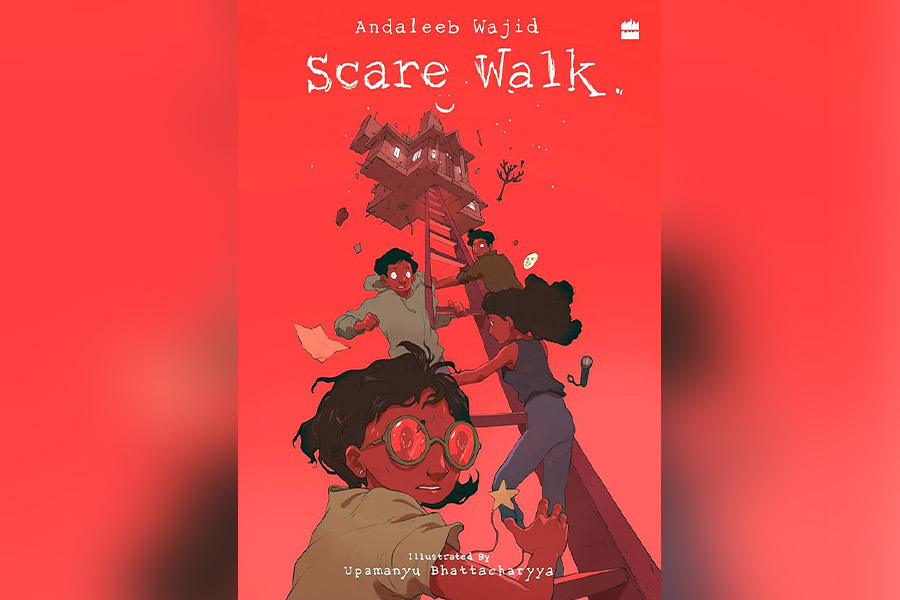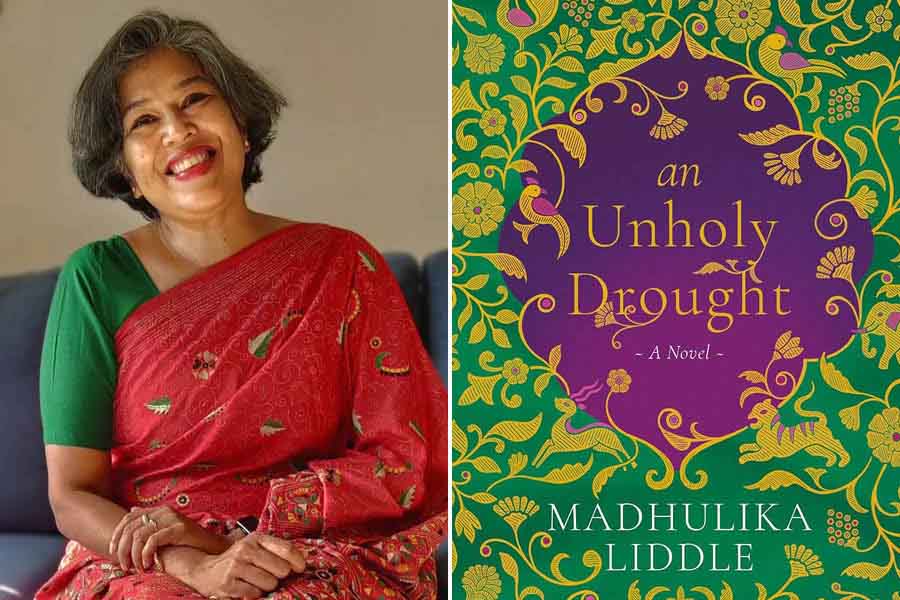“What’s the worst thing that could happen?”
This seemingly innocuous question sets off a series of unfortunate events for a group of four youngsters living in Bengaluru. Driven by a mix of curiosity and thrill-seeking, four teenagers set out for a Halloween scare walk expecting nothing more than jump scares. However, Andaleeb Wajid’s dexterity for horror scenarios gives Scare Walk (HarperCollins) an altogether different dimension, where things are nothing like they seem. Eerie storytelling comes together with the vibrancy of graphic illustrations by master designer Upamanyu Bhattacharyya. The book stands out not just for its spine-tingling narrative but also for its innovative use of visual elements like the garish red cover and dark backgrounds, creating an immersive reading experience.
As the narrative unfolds, the line between reality and imagination blurs
The story begins with a frisson of foreboding as the four friends brave Bengaluru traffic (scary in its own right) to reach an abandoned part of town. Things start to escalate almost immediately after the four of them hand over their phones to an odd, monstrous entity that bids them forward down a weed-grown forest path. Dark shadows and strange non-human figures grab and reach for the teenagers who struggle to accept that they have stepped out of their sheltered world of comfort and security.
The tension builds through the intriguing pacing of the author when the group steps into a house, where they discover an escape room situation only for the four friends to get separated. Each of them is faced with a personal nightmare with evil threatening to engulf their souls. It becomes creepily obvious that the plot is driven by the central theme of confronting fears and the unknown, as the characters navigate through a night fraught with unsettling occurrences and encounters with malevolent forces.
As the narrative unfolds, the line between reality and imagination blurs, heightening the psychological horror. This ambiguity serves to heighten the sense of unease, making the reader question what is real and what is merely a figment of the characters’ fears.
Bhattacharyya’s art is a careful balance of sharp contrasts and shadowy details
The surreal horror elements are brought to life by the art, which has the characters moving from one room to another as if they are moving between worlds. Each teenager in the group of friends is also portrayed with a depth that brings authenticity to their interactions and sincerity to their individual struggles. From family loss to wavering self-worth and the inevitability of nursing unrequited puppy love, Wajid draws her young characters with bold brush strokes of reality. The culmination of the characters’ thoughts, however, is in a feeling of fierce camaraderie, which prevents them from sacrificing their friends to the darkness.
While you cannot expect heroism from a bunch of teenagers toyed with by an evil power, you will be surprised by their resilience and determination to escape together. Not even being thrust into a cage with a monster or thrown off a cliff or watching their friend’s shape morph before their eyes can convince any of them to give up. Wajid’s ability to capture these nuances of character relationships through pithy dialogue enriches the novella, complementing the horror effectively.
Visually, Scare Walk is nothing short of breathtaking. The illustrations are integral to the storytelling, not just serving as a backdrop but actively amplifying the heart-stopping horror. Bhattacharyya’s art is striking, characterised by a careful balance of sharp contrasts and shadowy details that evoke instant suspense. They enhance the seamless transition of scenes from the real world of the city to a strange, illusory world with numerous landscapes.
The use of colour is particularly effective, with the palette shifting between muted, sombre tones and vivid, unnerving hues to reflect the emotional and narrative shifts in the story. This dynamic use of colour adds a layer of emotional depth to the graphic novel, making the tension more palpable.
New definitions of fear, bravery and friendship
This is a book that will constantly have you question whether the characters will make it out of the scare walk trap alive or not. And even if they do, you will be forced to wonder whether the teenagers will be the same after facing their darkest fears and deepest secrets. Ironically, this also poses one of the few drawbacks of Wajid’s story — that it raises more questions than it can answer. You are constantly guessing at the motivations of the dark entity trapping the youngsters or how they recover in the aftermath of their abrupt escape. The sudden shifts in dialogue seem confusing as the youngsters’ fears are often left unexplained and you are left contemplating what happens to the scare house once the characters leave.
But at its best, Scare Walk will expose you to new definitions of fear, bravery and friendship, exploring how individuals confront the unknown. Unlike a slapdash horror show that one forgets after the initial scares, Scare Walk introduces a level of psychological and physiological horror that is only balanced by the goodness of the youngsters’ hearts.
The abandoned area the friends explore serves as a place for revealing their internal struggles, and the supernatural elements are intertwined with their personal fears and growth. This thematic depth adds a layer of complexity to the story, making it not just a tale of horror but also a journey of self-discovery and courage for each character. Whether you are a horror aficionado or a newcomer to the genre, Wajid and Bhattacharyya’s skilful collaboration will draw you right in for a memorable experience that will stay with you long after you have breathlessly turned the last, climactic page of the story.












